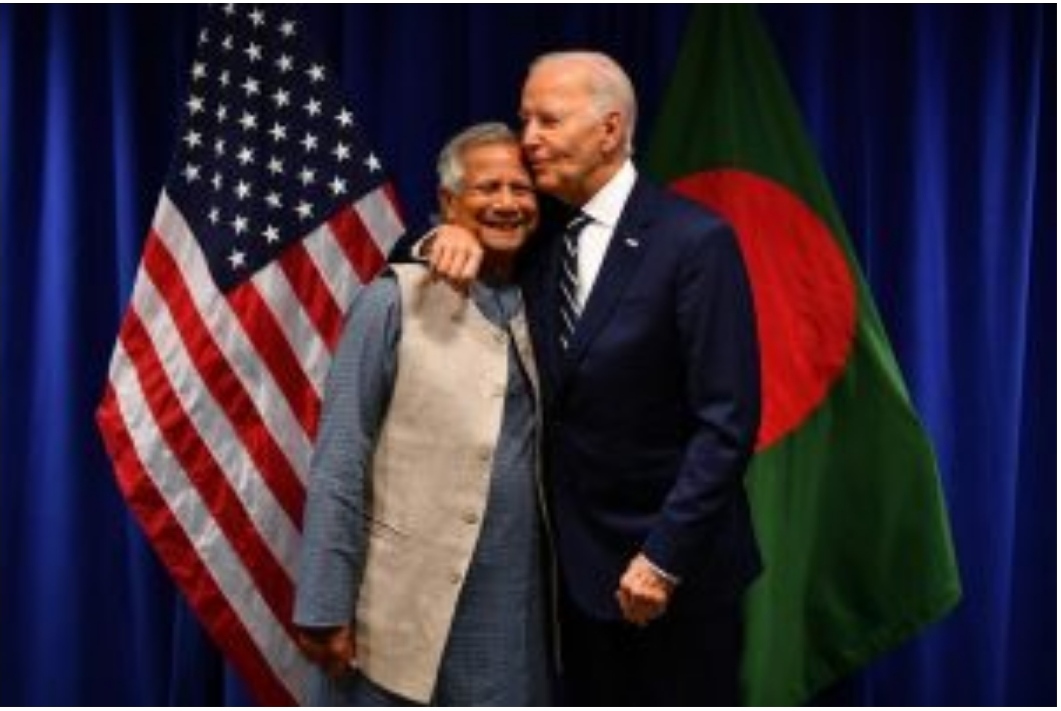‘Reset button’ of Prof Yunus starts erasing Bangladesh’s history

By M A Hossain
The much-hyped “Reset Button” of Prof Yunus seems to have been pressed and it has sparked concerns about the future direction of Bangladesh’s political landscape.
A significant force behind this so-called ‘reset button’ are extremist factions such as Jamaat-e-Islami (JeI) and Hizb Ut Tahrir (HuT), both of which are reportedly playing crucial roles in this mission.
While JeI opposed independence of Bangladesh and actively collaborated Pakistani occupation forces in brutalities and genocide on freedom-loving Bengalis, HuT openly denounces democracy and advocated establishment of caliphate.
The recent announcement by the Chief Advisor Muhammad Yunus, through the verified ‘X’ account (formerly known as Twitter), confirmed the cancellation of the observance of the national day of March 7 – a day of profound historical significance for Bangladesh.
Prof Yunus introduces student protestors who led anti-government revolution in Bangladesh. Former US President Bill Clinton, who is a friend of Dr Yunus is applauding those leaders in a program organized by the Clinton Global Initiative
According to UNESCO: “The Historic 7th March Speech of Bangabandhu Sheikh Mujibur Rahman” was delivered by Bangabandhu Sheikh Mujibur Rahman on 7th March, 1971 who led the people of Bangladesh to independence in 1971.
At that time when the Pakistani military rulers refused to transfer power to the Bengali nationalist leader Bangabandhu Sheikh Mujibur Rahman, whose party Awami League gained majority in the National Assembly of Pakistan in the general election held in 1970.
The speech effectively declared the independence of Bangladesh. The speech constitutes a faithful documentation of how the failure of post-colonial nation-states to develop inclusive, democratic society alienates their population belonging to different ethnic, cultural, linguistic or religious groups.
Involvement in the current Yunus administration’s decision has raised eyebrows across the country, as his so-called ‘reset button’ appears to be setting a dangerous precedent for the nation’s future thus openly disrespecting the sacrifice of three million lives.March 7, 1971, holds a special place in the heart of every Bangladeshi as the day when Bangabandhu Sheikh Mujibur Rahman delivered his historic speech at the Racecourse Ground (now Suhrawardy Udyan), urging the people of East Pakistan to prepare for the struggle for independence.
His words, “This time the struggle is for our freedom, this time the struggle is for our independence”, galvanized the masses, marking the beginning of a definitive moment in Bangladesh’s history.
The speech served as a rallying cry for the oppressed Bengali people who had been subjected to years of political and economic subjugation by the central government of West Pakistan. It also laid the groundwork for the subsequent War of Independence, leading to the birth of Bangladesh on December 16, 1971.
Following ouster of Sheikh Hasina from power, Prof Yunus met US President Joe Biden. Yunus has decades old extremely cordial relationship with Joe Biden, Barack Obama, Bill and Hillary Clinton and most of the key figures in the Democratic Party
The cancellation of the March 7 observance, which honors this monumental speech, is therefore seen as not only disrespectful to the memory of the liberation movement but also as an attempt to rewrite history. The involvement of Jamaat-e-Islami, which actively opposed the independence of Bangladesh in 1971, makes this move all the more alarming. Many see this as an attempt to erase the legacy of the independence movement and promote a revisionist history that denies the atrocities committed by the Jamaat during the war.
Today’s dismissal of the significance of March 7 could eventually lead to erasing the importance of March 26 or December 16, should they be given enough time.
The interim government, which many hoped would bring about a period of stability and reform, now appears to be little more than an extension of the extremist factions that have long undermined the country’s democratic foundations.
Jamaat-e-Islami, which has never accepted Bangladesh’s sovereignty, and Hizb Ut Tahrir, a group dedicated to establishing an Islamic caliphate, have both reportedly infiltrated the highest levels of the interim government – covertly and overtly, thus pushing-forward their agenda of Islamization or Talibanization of the country.
Meanwhile, there are signs of Yunus loyalists – especially the leaders of anti-Hasina “revolution” of floating a new political party – which they see as alternative to Bangladesh Nationalist Party (BNP), Awami League and other existing political parties in the country.
They also are injecting Islamists inside judiciary, civil administration, police and even armed forces.
What is particularly concerning is the way JeI and HuT have strategically positioned themselves as the architects of this ‘Reset Button’ mission.
By placing themselves at the forefront of the political shift, they have managed to push their political agendas under the guise of “reform” and “national interest”.

A recent remark by Masud Sayedee (son of convicted war criminal Delwar Hossain Sayedee) – “The ICT Tribunal is ready. Let’s start playing”, sparked controversy across the country. The Chief Prosecutor of the ICT Tribunal, Mr. Tajul Islam, is believed to be politically motivated and inclined towards JeI.Bangladesh has long prided itself on being a secular and democratic nation, but the increasing influence of Jamaat-e-Islami and Hizb Ut Tahrir threatens to unravel these fundamental principles.
The fact that these groups have managed to gain such a foothold in the interim government raises serious questions about the future of democracy in Bangladesh.While most of the recent political upheavals and extremist actions can be traced back to Jamaat-e-Islami and Hizb Ut Tahrir, it is the Bangladesh Nationalist Party (BNP) that has been consistently blamed for the unrest totally.
This has become a common tactic among those in power, who seek to deflect attention from the real culprits by pointing fingers at the BNP. By doing so, Jamaat and Hizb Ut Tahrir have managed to shield themselves from scrutiny while continuing to push their agenda behind the scenes.
One of the most alarming recent developments has been the decision to grant indemnity to student protesters who were involved in the killing of the members of police as well as Hindus during July-August demonstrations and following ouster of Sheikh Hasina.
While protests are a legitimate form of political expression, the killing of law enforcement members alongside Hindus represents a serious breach of the rule of law.
Following ouster of Sheikh Hasina from power, supporters of Dr Yunus and members of Hizb Ut Tahrir marches in Dhaka streets chanting “Naraye Taqbir, Allahu Akbar” slogan demanding establishment of Caliphate in Bangladesh
By offering indemnity to these protestors, the government is setting a dangerous precedent that could have far-reaching consequences for law and order in the country. It sends the message that violence against state institutions can be excused if it aligns with certain political objectives.
This could embolden militant groups, who may feel that they too can act with impunity in the future.
The decision to indemnify the protestors also undermines the credibility of the justice system and erodes public trust in the rule of law. It raises serious questions about the government’s commitment to maintaining order and ensuring accountability for criminal acts, regardless of political affiliation.
Amidst the growing political instability, one institution that remains a stabilizing force in Bangladesh is the Army. The Bangladeshi military has a long history of patriotism and service to the nation, and there is hope that it will not allow the extremist agendas of Jamaat-e-Islami and Hizb Ut Tahrir to take root.
The Army has traditionally played a key role in maintaining order during times of political crisis, and it is likely that they will step in if the situation continues to deteriorate. However, if Trump wins the upcoming US election, there will be a drastic change in the political landscape of Bangladesh.

The Bangladesh Armed Forces must be prepared to respond to the new circumstances to uphold the sovereignty of the Motherland.
The ‘Reset Button’ of Prof. Yunus, driven by the extremist ideologies of Jamaat-e-Islami and Hizb Ut Tahrir, is pushing Bangladesh towards a period of profound political and social uncertainty.
The cancellation of the March 7 national day, the influence of these groups within the interim government, and the dangerous precedents being set in terms of law and order are all signs that Bangladesh’s democratic foundations are under threat.
As the country moves forward, it will be crucial for all patriotic forces—whether in the military, the judiciary, or civil society—to come together to protect the principles of democracy, secularism, and justice.
Bangladesh’s future depends on its ability to resist the radical agendas of extremist groups and to uphold the legacy of its independence movement. The fight to preserve the nation’s identity and values must remain a top priority for all.



